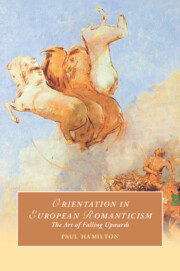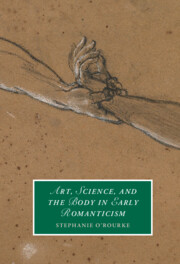Orientation in European Romanticism
Exploring the experiments in individual and national self-consciousness conducted during the Romantic period, this essential comparative study of European literature, philosophy and politics makes original and often surprising connections and contrasts to reveal how personal and social identities were re-orientated and disorientated from the French Revolution onwards. Reviving a contested moment in the history of aesthetic theory, this study shows how the growing awareness of irresolution in Kant's third Kritik allowed Romantic writers to put the aesthetic to radical uses not envisaged by its parent philosophy. It also recounts how they would go on to force philosophy to revise received notions of authority, empowering women and subordinated ethnic groups to re-orientate existing hierarchies. The sheer range and variety of writers covered is testament both to the breadth of writing that Kant's philosophy so rashly legitimated and to the wider importance of philosophy to the understanding of Romantic literature.
- Models comparative analysis and enables wider interpretation of English and European works of literature by comparison with each other
- Explains the philosophical importance of literature in the Romantic period, and the importance of literature to political theory, placing in critical perspective the modernism and post-modernism to come and demonstrating the absolute necessity of an inter-disciplinary approach to Romanticism
- Demonstrates the continuing relevance of Romanticism for psychoanalysis and for near-contemporary theoretical and philosophical discussions of literature in France and Germany
Reviews & endorsements
'Orientation in European Romanticism lends itself to specialists and nonspecialists alike if one has the grit and raw passion for further exploration of European Romanticism and its continued aesthetic influence. This is indeed a worthy, if challenging, addition to the current critical literature on European Romanticism and aesthetics in general.' Wayne Deakin, European Romantic Review
Product details
April 2025Paperback
9781009268257
320 pages
229 × 152 × 17 mm
0.468kg
Available
Table of Contents
- Part I. Disorientating Kant:
- 1. Introduction: sublimity and abjection
- 2. Kleist and the Kant-crisis
- 3. Hölderlin and the philosophers
- Part II. The Uses of Abjection:
- 4. The feminist humanism of Felicia Hemans: the poetics of Records of Woman (1828)
- 5. Thomas Moore and the national lyric
- 6. Ugo Foscolo's literary hypocrisy
- Part III. Optimism and Pessimism:
- 7. Balzac's comic pessimism
- 8. George Sand's optimism
- Part IV. Romancing the Modern:
- 9. Retrospect: Rilke translates Leopardi.



